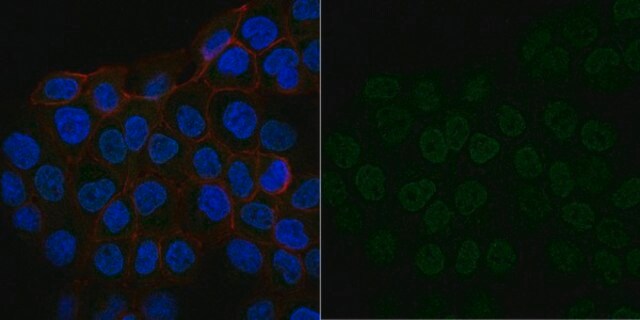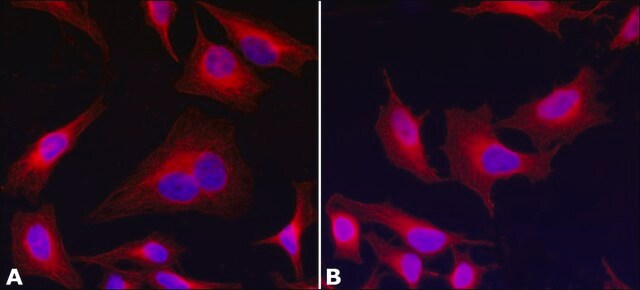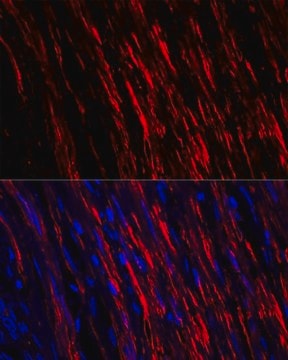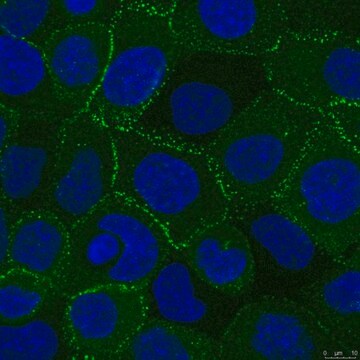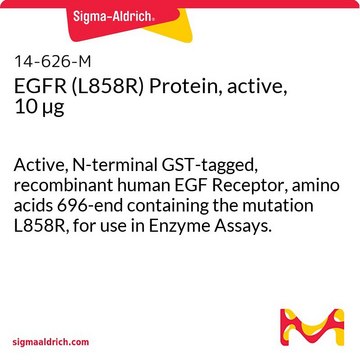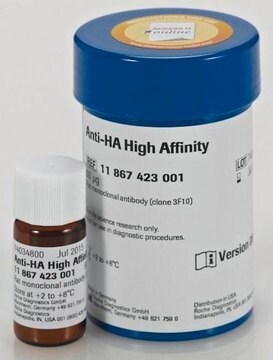おすすめの製品
由来生物
mouse
品質水準
抗体製品の状態
purified antibody
抗体製品タイプ
primary antibodies
クローン
6F6-B5, monoclonal
フォーム
liquid
含まれません
preservative
化学種の反応性
human
メーカー/製品名
Calbiochem®
保管条件
OK to freeze
avoid repeated freeze/thaw cycles
アイソタイプ
IgG1
輸送温度
wet ice
保管温度
−20°C
ターゲットの翻訳後修飾
unmodified
遺伝子情報
human ... GNA13(10672)
詳細
Anti-GNA13, mouse monoclonal, clone 6F6-B5, recognizes the ~40-45 kDa GNA13 protein in HepG2 cells. It is validated for use in ELISA and Western blotting.
Purified mouse monoclonal antibody. Recognizes the ~40-45 kDa GNA13 protein.
Recognizes the ~40-45 kDa GNA13 protein in HepG2 cells.
免疫原
Full-length, recombinant, human GNA13 (aa 1-378), expressed as a GST fusion protein
アプリケーション
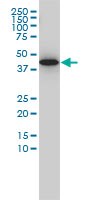
ELISA (see comments)
Immunoblotting (1-5 g/ml)
警告
Toxicity: Regulatory Review (Z)
物理的形状
In PBS, pH 7.2.
再構成
Following initial thaw, aliquot and freeze (-20°C).
アナリシスノート
Negative Control
293T cells
293T cells
Positive Control
HepG2 cells
HepG2 cells
その他情報
For ELISA, this antibody can be used as the capture antibody; recommended concentration is 10 ng/ml, 1 µg/well, 100 µl total volume. Variables associated with assay conditions will dictate the proper working dilution.
法的情報
CALBIOCHEM is a registered trademark of Merck KGaA, Darmstadt, Germany
適切な製品が見つかりませんか。
製品選択ツール.をお試しください
保管分類コード
12 - Non Combustible Liquids
WGK
nwg
引火点(°F)
Not applicable
引火点(℃)
Not applicable
適用法令
試験研究用途を考慮した関連法令を主に挙げております。化学物質以外については、一部の情報のみ提供しています。 製品を安全かつ合法的に使用することは、使用者の義務です。最新情報により修正される場合があります。WEBの反映には時間を要することがあるため、適宜SDSをご参照ください。
Jan Code
ST1629-100UG:
試験成績書(COA)
製品のロット番号・バッチ番号を入力して、試験成績書(COA) を検索できます。ロット番号・バッチ番号は、製品ラベルに「Lot」または「Batch」に続いて記載されています。
Suhail Ahmed Kabeer Rasheed et al.
The Journal of biological chemistry, 288(11), 7986-7995 (2013-01-19)
G protein-coupled receptors (GPCRs) and their ligands have been implicated in progression and metastasis of several cancers. GPCRs signal through heterotrimeric G proteins, and among the different types of G proteins, GNA12/13 have been most closely linked to tumor progression.
Suhail Ahmed Kabeer Rasheed et al.
Oncogene, 37(10), 1340-1353 (2017-12-20)
Treatment failure in solid tumors occurs due to the survival of specific subpopulations of cells that possess tumor-initiating (TIC) phenotypes. Studies have implicated G protein-coupled-receptors (GPCRs) in cancer progression and the acquisition of TIC phenotypes. Many of the implicated GPCRs
ライフサイエンス、有機合成、材料科学、クロマトグラフィー、分析など、あらゆる分野の研究に経験のあるメンバーがおります。.
製品に関するお問い合わせはこちら(テクニカルサービス)

